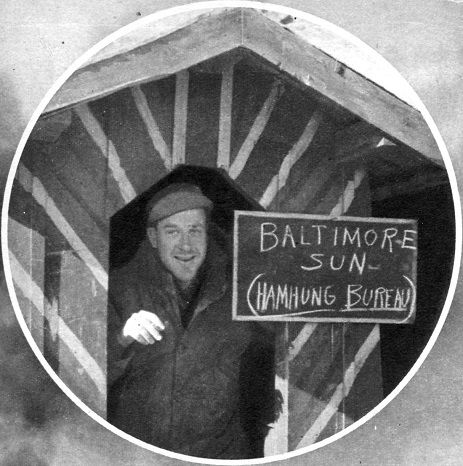| Home |

| Photo of the Month October 2024 |
| See Previous Photos Unknown Faces and Places |
 |
| Courtesy Katherine L. Tucker |
Deployed to Korea as a foreign correspondent during the Korean War, journalist Richard Kennedy Tucker poses with this humorous hand-lettered sign advertising the "Hamhung Bureau" of his employer, the Baltimore Sun.
Richard was a native of Fort Madison, IA of the family of George Wilson and Clara (Miner) Tucker. He received a bachelor's degree in journalism from the University of Iowa, and his first assignment was as a reporter for the Indianapolis News. After the outbreak of World War II, he joined the U.S. Army and was assigned to the staff of Gen. Douglas MacArthur in the Pacific Theatre as an infantry correspondent and press officer. At the Japanese surrender in 1945, he watched the ceremony aboard the USS Missouri in Tokyo Bay. A year later, in 1946, he and his wife Jeanne relocated to Maryland when he joined the staff of the Sun. He was sent to Korea in 1950 to cover the conflict for the newspaper.
One of Richard's colleagues at the Sun was William Manchester, future author of such bestsellers as The Death of a President (1967), The Arms of Krupp (1968), American Caesar: Douglas MacArthur (1978) and The Last Lion: Winston Spencer Churchill (1983 and 1988). In a recap of those years, Manchester wrote in his farewell column in the Baltimore Evening Sun in 1995 that they "were the happiest I have ever known. Nothing beats the life of a reporter; his days, as H.L. Mencken wrote, 'chase one another like kittens chasing their tales.' And I was in great company." After mentioning "Dick Tucker" by name among several others, Manchester added that his colleagues were "survivors of the war, most of us, all drawn to Baltimore by the reputation of a great daily with a circulation of nearly a quarter-million. There has never been a newspaper like it, or a staff like ours."
Richard went on to become managing editor of Xerox Corporation's Read and Current Events in Connecticut. In retirement, circa 1983, the Tuckers returned to his hometown in Iowa. He authored the 1991 book The Dragon and the Cross: The Rise and Fall of the Ku Klux Klan in Middle America, produced by Archon Books. His friend Manchester said the volume was "meticulously researched, vividly told, and compulsively readable. It is a classic piece of Americana."
Richard comes from a line of pioneers in his branch of the family. His great-grandfather Nathan Miner was an 1844 settler of Iowa, and Nathan's parents Frederick and Elizabeth (Sechman) Miner Sr. were pioneers of Ohio in 1812.
|
Copyright © 2024 Mark A. Miner |
